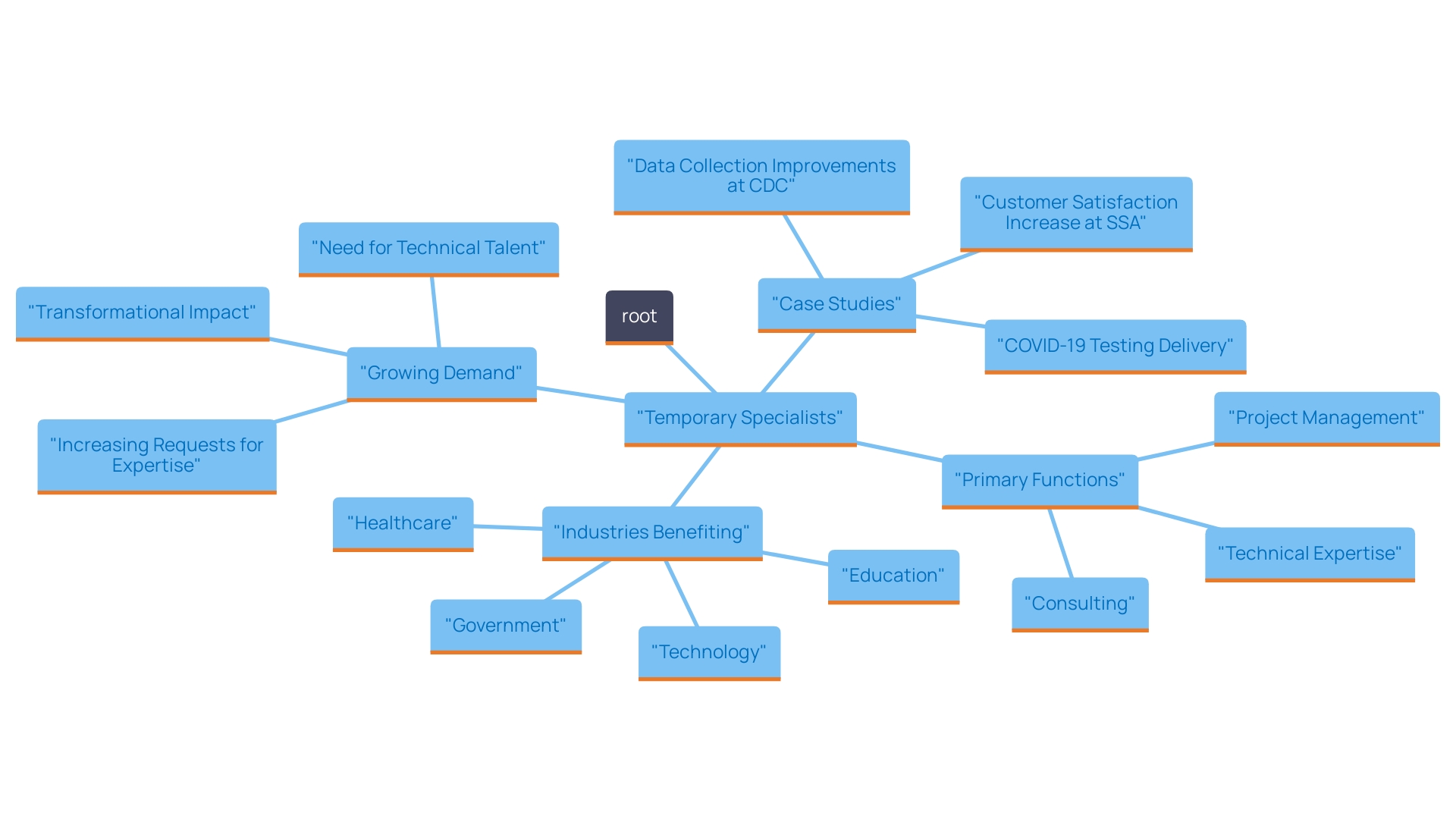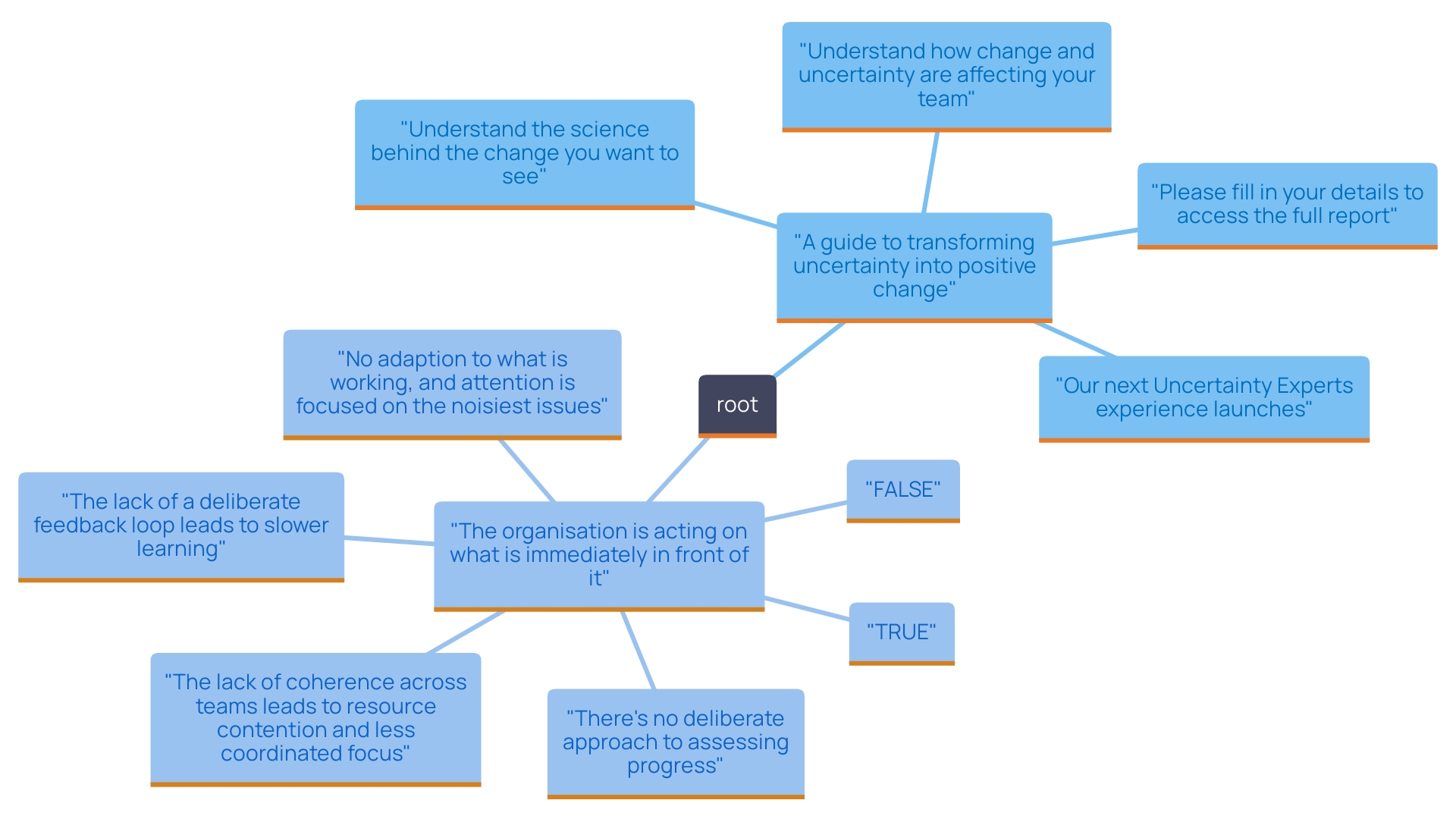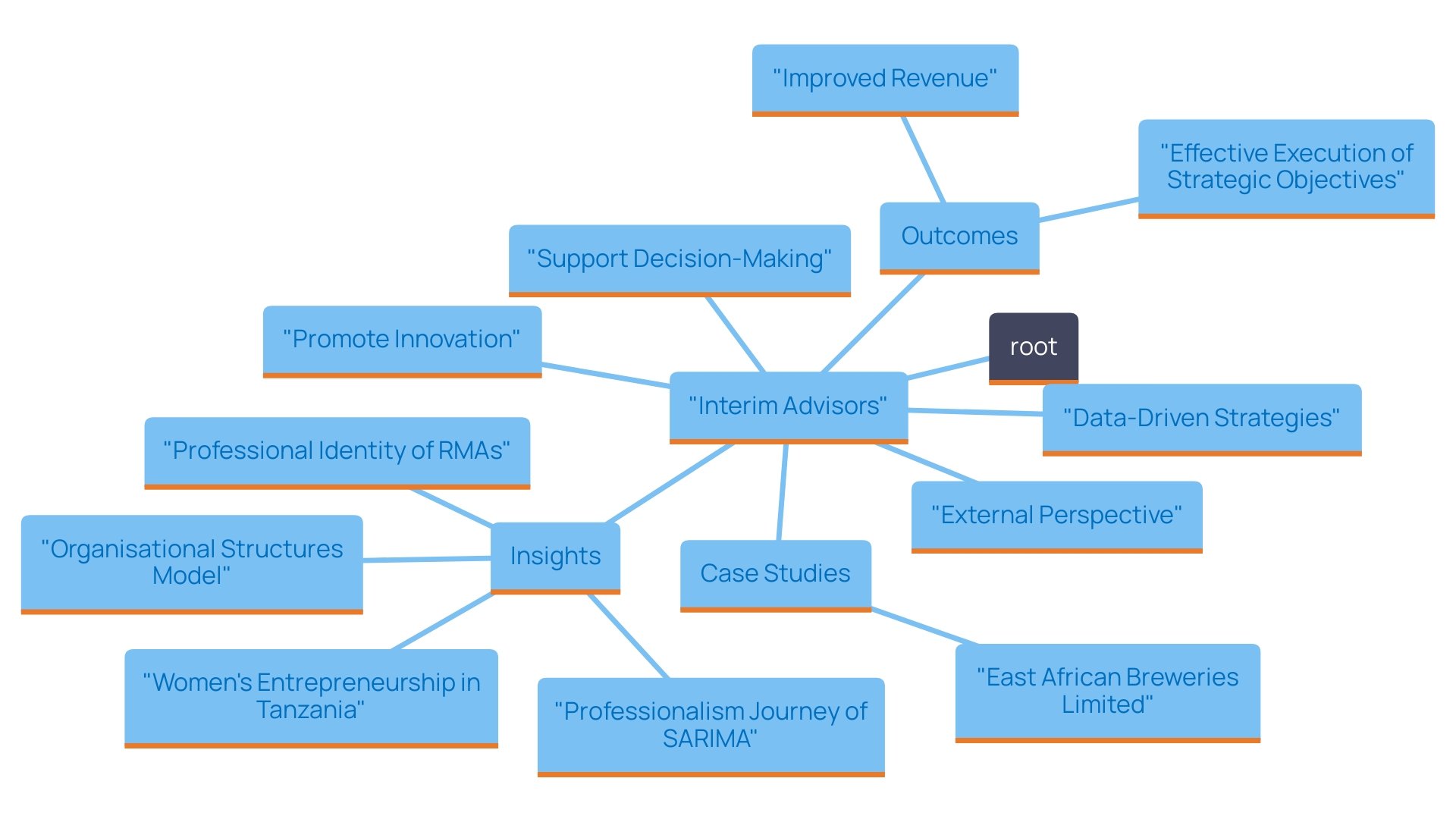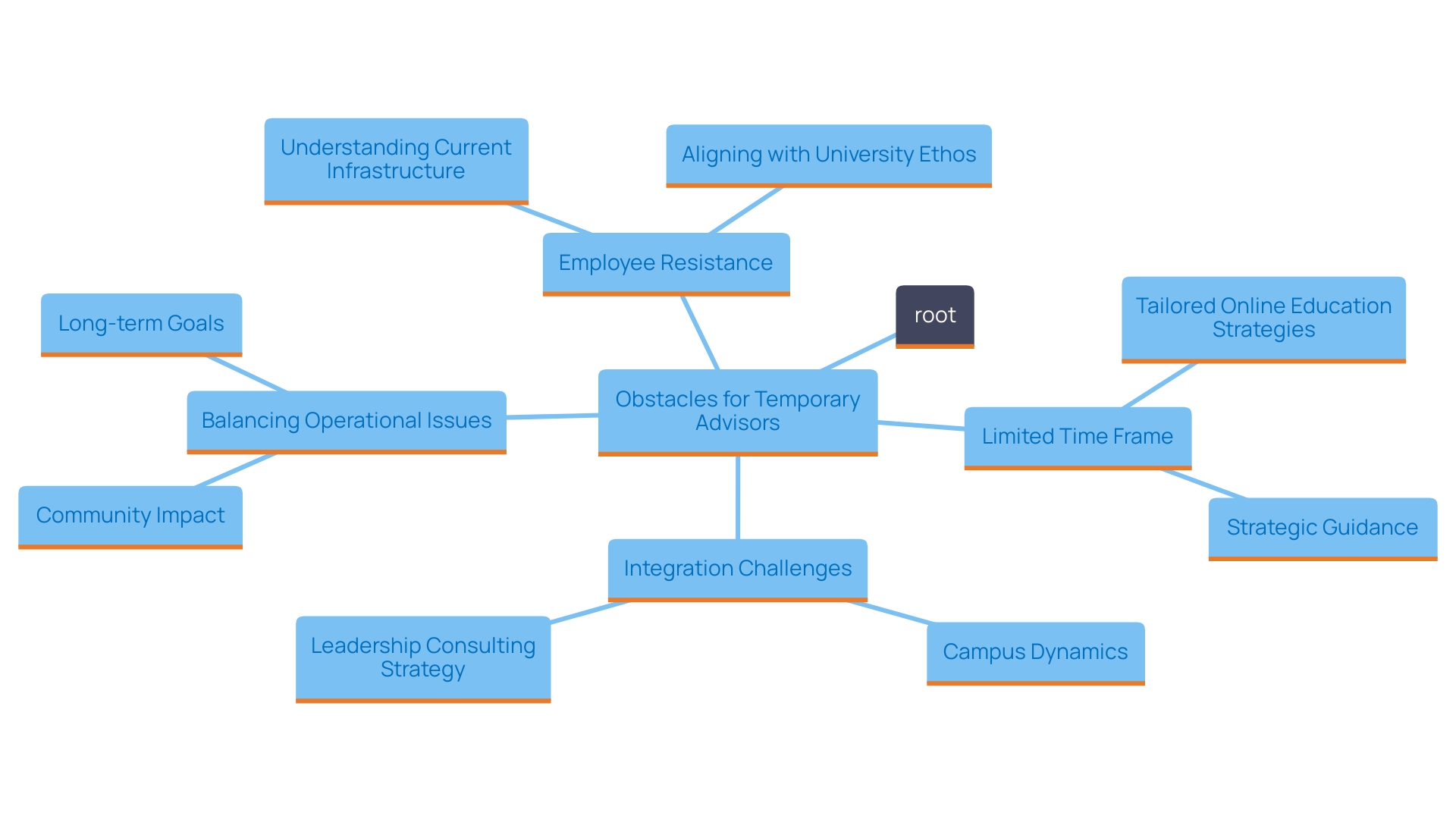Introduction
In a rapidly evolving business landscape, organizations often find themselves at a crossroads, requiring immediate expertise to navigate complex challenges. Interim consultants emerge as vital assets, stepping in to provide leadership and specialized skills during crucial transitions or crises. These seasoned professionals not only fill management gaps but also drive strategic initiatives that enhance organizational performance.
As the demand for their services grows, understanding the multifaceted role of interim consultants becomes essential for businesses aiming to adapt swiftly and effectively. This article delves into the defining responsibilities, impacts, and challenges faced by interim consultants, offering insights that empower organizations to leverage their expertise for transformative success.
Defining the Role of Interim Consultants
Temporary specialists are experienced individuals hired by companies on a short-term basis to address particular issues or manage important projects. Their primary function is to deliver during periods of transition, crisis, or transformation. Working under a fixed-term agreement, temporary specialists offer a strategic benefit by allowing entities to access high-level skills without the long-term financial obligation linked to permanent hires. This flexibility is particularly crucial in industries such as retail, hospitality, and finance, where businesses must swiftly adapt to fluctuating market dynamics.
As the demand for temporary leadership continues to rise globally—reflecting a growing need for on-demand access to senior management—these professionals not only fill management gaps but also play a vital role in implementing strategies designed to stabilize and enhance organizational performance in critical times. In 2024, companies are increasingly acknowledging the significance of temporary advisors in managing transitions efficiently. For instance, nonprofit and government entities are actively seeking independent talent to amplify their impact, integrate new technologies, and improve service delivery and operational efficiency.
By integrating insights from specialists in AI/ML, temporary advisors can transform operations by optimizing decision-making procedures and employing real-time analytics to assess business performance. According to a recent report by the Management Consulting Association, 'Independent advisors are essential in assisting entities to adapt to change and enhance performance improvements.' This trend underscores a strategic shift towards leveraging external expertise to enhance overall effectiveness, particularly in adapting to changing market conditions and consumer behaviors. By utilizing temporary advisors, companies can guarantee they are well-prepared to manage the intricacies of contemporary business environments.
Case studies demonstrate this effect:
- A nonprofit organization effectively executed a new digital strategy with the assistance of a temporary advisor, leading to a 30% rise in service delivery efficiency.
- Another case involved a retail company that, with temporary guidance, reduced operational costs by 20% while improving customer satisfaction scores.
Such examples emphasize the tangible advantages temporary advisors provide during organizational changes, ensuring companies stay competitive amid evolving challenges.

Key Responsibilities of Interim Consultants
The duties of temporary advisors are diverse and customized to address the specific requirements of a business during transitional phases. Their key functions generally encompass the following:
- Leadership and Management: Acting as pivotal leaders, interim advisors guide teams through periods of change, instilling confidence and clarity. They make critical decisions that can significantly change the trajectory of projects or the entity as a whole, supporting a streamlined decision-making process that aligns with the 'Decide & Execute' strategy.
- Assessment and Strategy Development: A comprehensive evaluation of the current organizational landscape is essential. Interim advisors conduct in-depth analyses of existing processes, financial health, and operational efficiencies to devise actionable strategies that align with the organization’s objectives, ensuring hypotheses are tested and validated in line with 'Test & Measure' principles.
- Implementation of Change: Transitioning from planning to execution, temporary advisors actively carry out necessary adjustments. This may involve reorganizing teams, streamlining operations, or improving financial management practices, all while utilizing real-time analytics to monitor and adjust strategies effectively, embodying the 'Update & Adjust' approach.
- Stakeholder Communication: Clear and effective communication with all stakeholders—employees, clients, and board members—is paramount. Temporary advisors are tasked with expressing the vision for transformation and involving stakeholders during the process, promoting alignment and backing for new initiatives.
- Performance Monitoring: Ultimately, temporary advisors are responsible for the continuous evaluation of change effectiveness. They evaluate outcomes against predefined metrics using , making necessary adjustments to ensure that improvements are not only achieved but sustained over time, operationalizing lessons learned throughout the turnaround process.
According to the Management Report 2023, temporary management is experiencing a resurgence, with 75% of temporary managers identifying the integration of home office as a critical challenge. This highlights the increasing reliance on these professionals to bridge staffing gaps and lead transformative initiatives in a post-pandemic landscape. Furthermore, industry specialists highlight that the average length of temporary advisor engagements is roughly six to twelve months, depending on the complexity of the project and the particular requirements of the entity. Through these essential responsibilities, temporary advisors enable organizations to navigate challenges swiftly and effectively, leveraging their expertise to drive meaningful results while building lasting relationships and operationalizing the lessons learned.

The Impact of Interim Consultants on Organizational Change
Interim advisors play a critical role in driving organizational change, particularly during periods of crisis or transition. Their external perspective allows them to identify and address underlying issues that internal teams may overlook. For example, in a retail setting experiencing falling sales, a temporary advisor can swiftly assess market dynamics and customer preferences. By employing data-driven testing of hypotheses, they ensure maximum return on invested capital. This proactive assessment often leads to the implementation of targeted strategies that rejuvenate sales channels and enhance customer engagement.
Additionally, bringing in a temporary advisor can encourage a culture of innovation and adaptability within the organization. According to Alan Jackson, a senior vice president at BCG, temporary advisors not only facilitate change but also empower employees to embrace new initiatives, providing experienced leadership during transitions. They support a streamlined decision-making cycle, enabling your team to take decisive action to preserve business health.
CFOs frequently grapple with balancing immediate operational needs against the long-term vision of organizational transformation. The impact of temporary advisors in achieving outcomes is well-documented through various case studies. Organizations that involve temporary advisors frequently witness faster turnaround times for recovery strategies and more effective execution of strategic objectives. This is supported by real-time analytics that continually monitor business performance. This dual focus on attaining prompt results while laying a groundwork for enables temporary advisors to skillfully lead organizations through intricate challenges.
Studies show that when modifications are carried out efficiently, it can result in improved revenue generation, emphasizing the concrete advantages of involving temporary consultants during transformative phases. For instance, the case study of East African Breweries Limited in Kenya demonstrates how strategic management processes can be navigated through well-planned execution and the influence of external expertise. The firm's capacity to adjust to market fluctuations led to a 15% rise in revenue over two years, showcasing the effect of strategic management and temporary leadership in attaining significant organizational results while mastering the cash conversion cycle.

Challenges Faced by Interim Consultants
Temporary advisors contribute extensive knowledge to businesses but frequently encounter that can hinder their capacity to implement effective improvements. Recognizing these obstacles is crucial for entities aiming to leverage interim management successfully.
- Resistance to Change: One of the most significant hurdles is employee resistance, particularly when new leadership is introduced. Approximately 70% of change initiatives fail due to employee resistance (source: Change Management Research 2023). Employees may feel uncertain about their roles and the organization’s future direction, leading to skepticism about new initiatives. To counter this, temporary advisors must prioritize building trust and rapport quickly, ensuring that team members feel heard and appreciated. As noted by industry expert Jane Doe, "Building relationships quickly is crucial for temporary leaders; it sets the foundation for successful change."
- Limited Time Frame: The temporary nature of their engagement imposes a strict deadline for achieving results. This pressure can lead to hasty decision-making if not managed carefully. Interim consultants need to adopt a focused approach to deliver impactful results within their limited timeframe, ensuring that their strategies are effective and sustainable. A recent report indicates that 60% of interim managers feel pressured to deliver results too quickly, which can compromise the quality of decisions (source: Interim Management Insights 2024). Our team supports a shortened decision-making cycle throughout the turnaround process, allowing your team to take decisive action and preserve your business.
- Integration with Existing Teams: Establishing rapport with existing staff can be particularly challenging, especially in organizations where team dynamics are already fragile. Interim advisors must navigate this landscape with a blend of assertiveness and collaboration to foster a productive working environment. Effective communication and engagement strategies are paramount in creating a sense of unity among team members. As emphasized by expert John Smith, “The ability to integrate quickly with teams can determine an interim advisor’s effectiveness.” We are dedicated to fostering strong, enduring relationships by implementing the lessons learned during the turnaround process.
- Balancing Short-term and Long-term Goals: Interim professionals are often assigned to tackle immediate operational issues while simultaneously establishing the foundation for sustainable change. This dual focus requires a strategic mindset, enabling them to prioritize actions that align with the entity’s long-term vision while also delivering quick wins. For example, employing real-time analytics enables temporary advisors to track performance metrics consistently, facilitating prompt modifications that align with both immediate and strategic objectives.
As noted in the Management Report 2023, there is an increasing demand for temporary management post-pandemic, as many organizations acknowledge the value these professionals provide in bridging staffing and skill gaps. By understanding and proactively addressing these challenges, CFOs can create an environment that supports interim consultants, ultimately empowering them to deliver maximum impact during transitional periods through continuous business performance monitoring and operationalizing turnaround lessons.

Conclusion
Interim consultants are essential players in the modern business landscape, providing organizations with the flexibility and expertise needed to navigate complex challenges during transitional periods. Their multifaceted roles encompass leadership, strategic assessment, change implementation, stakeholder communication, and performance monitoring. By stepping into management gaps, these professionals enable businesses to respond swiftly to market dynamics, ensuring that they remain competitive and capable of achieving their strategic objectives.
The impact of interim consultants is evident across various industries. Through real-time analytics and data-driven decision-making, they not only facilitate immediate operational improvements but also foster a culture of innovation and adaptability. Successful case studies demonstrate that organizations engaging interim consultants experience accelerated turnaround times and enhanced revenue mobilization.
This underscores the value of leveraging external expertise to drive both short-term results and long-term organizational transformation.
However, the journey is not without its challenges. Resistance to change, time constraints, team integration, and balancing immediate with long-term goals can pose significant hurdles. By recognizing and addressing these challenges, organizations can create an environment that empowers interim consultants to maximize their impact.
Ultimately, engaging interim consultants is a strategic move that positions organizations for success in an ever-evolving business landscape, ensuring they are equipped to tackle the complexities of today and tomorrow.
Frequently Asked Questions
What are temporary specialists and their primary function?
Temporary specialists are experienced individuals hired on a short-term basis by companies to address specific issues or manage important projects. Their primary function is to provide leadership and specialized expertise during periods of transition, crisis, or transformation.
Why do companies hire temporary specialists?
Companies hire temporary specialists to access high-level skills without the long-term financial commitment associated with permanent hires. This flexibility is especially important in industries that need to quickly adapt to changing market dynamics.
How do temporary advisors contribute to organizational performance?
Temporary advisors fill management gaps and implement strategies that stabilize and enhance organizational performance during critical times. They are increasingly recognized for their significance in managing transitions efficiently.
What industries are particularly benefiting from temporary specialists?
Industries such as retail, hospitality, and finance are particularly benefiting from temporary specialists as they often face fluctuating market dynamics and require rapid adaptability.
What are the key functions of temporary advisors?
The key functions of temporary advisors include: 1. Leadership and Management: Guiding teams through change and making critical decisions. 2. Assessment and Strategy Development: Evaluating current processes and devising actionable strategies. 3. Implementation of Change: Executing necessary adjustments and monitoring strategies. 4. Stakeholder Communication: Engaging with all stakeholders to promote alignment. 5. Performance Monitoring: Evaluating change effectiveness against predefined metrics.
What challenges do temporary advisors face in their roles?
Temporary advisors face several challenges, including: 1. Resistance to Change: Employees may resist new leadership and initiatives. 2. Limited Time Frame: The temporary nature of their role can pressure them to deliver results quickly. 3. Integration with Existing Teams: Building rapport with staff can be challenging. 4. Balancing Short-term and Long-term Goals: They must address immediate operational issues while establishing a foundation for sustainable change.
How can temporary advisors impact an organization's adaptability?
Temporary advisors bring an external perspective that helps identify and address underlying issues, enabling organizations to adapt quickly to market dynamics and customer preferences. They can implement targeted strategies that rejuvenate sales and enhance engagement.
What evidence supports the effectiveness of temporary advisors?
Case studies show that organizations involving temporary advisors often experience faster turnaround times and improved revenue generation. For example, a nonprofit saw a 30% rise in service delivery efficiency with a temporary advisor's help, and a retail company reduced operational costs by 20% while improving customer satisfaction.
How long do temporary advisor engagements typically last?
The average length of temporary advisor engagements is approximately six to twelve months, depending on the project's complexity and the organization's specific needs.




